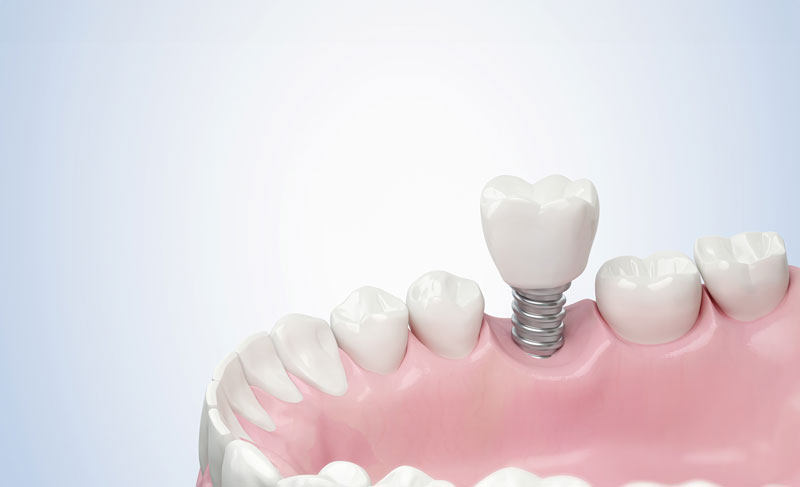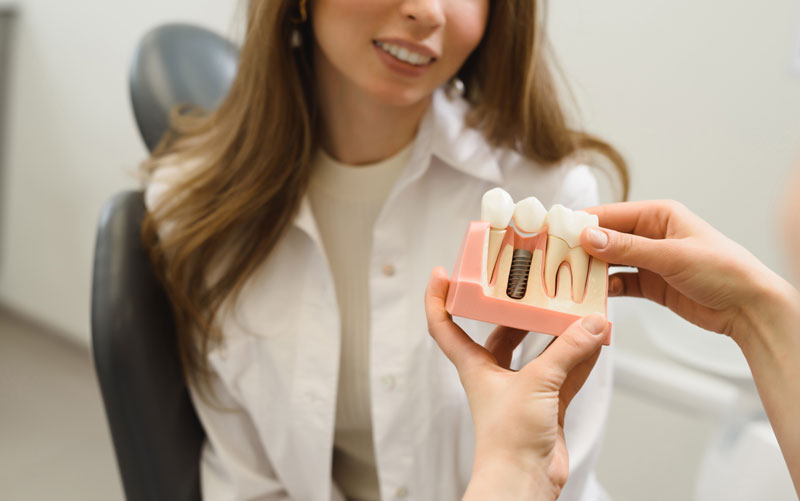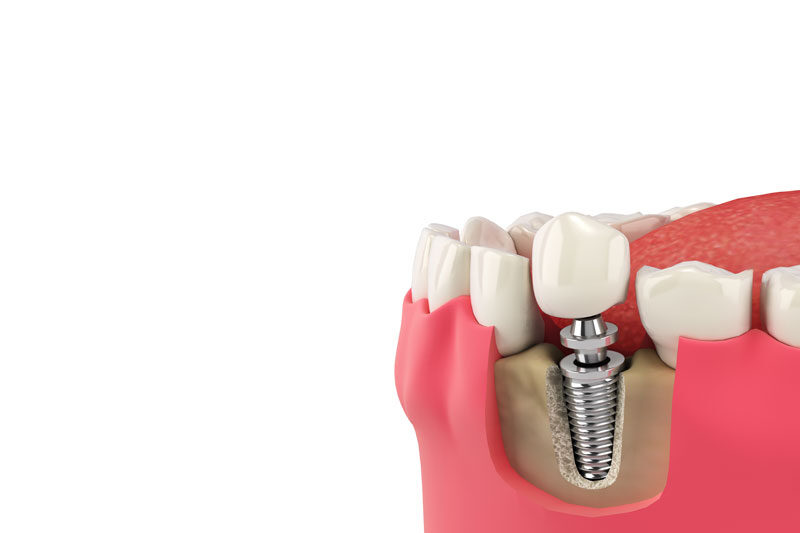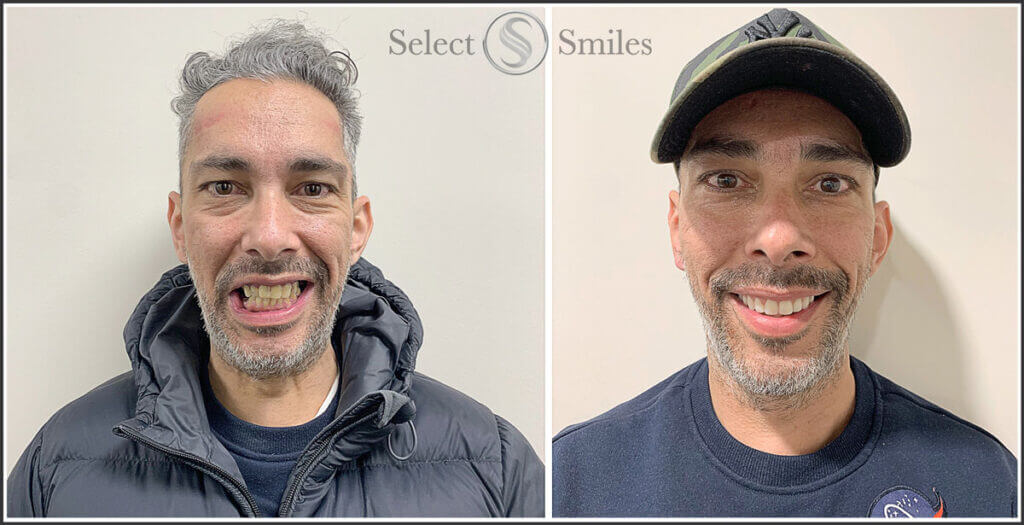What is a Single Tooth Implant?
A single tooth implant is a dental procedure that replaces a missing tooth with an artificial tooth root. The implant is a small, screw-shaped post typically made of titanium or a titanium alloy. This post acts as the artificial tooth root and is surgically placed in your jawbone.
Once the implant is placed, it will gradually fuse with the jawbone through a process called osseointegration. This process creates a stable foundation for your new tooth. The implant dentist will then attach an abutment to the implant, which connects the implant to the artificial tooth. The artificial tooth, also known as a dental crown, is custom-made to match the colour and shape of your natural teeth.
Unlike traditional bridges or dentures, a single tooth implant does not rely on adjacent teeth for support. This can help maintain the health of the surrounding teeth.
There are different types of implants, but for a single missing tooth, the most common approach is an endosteal implant. This type of implant is placed directly into the jawbone and is often selected for its stability. In some cases, if the jawbone lacks sufficient density, additional procedures such as bone grafting may be required before implant placement.

Why You Should Replace a Missing Tooth
Leaving a single missing tooth untreated can have significant consequences for your dental health and overall well-being.
A missing tooth can affect the alignment of your surrounding teeth, leading to shifting and bite problems over time. It can also impact your jawbone health, as the absence of a tooth root can cause bone loss in the area where the tooth used to be.
Bone loss in the jawbone can lead to changes in facial structure, potentially causing a sunken appearance over time. Additionally, gaps in your teeth can increase the risk of gum disease, as food particles and bacteria may accumulate more easily in these spaces. This can lead to infections that further affect your oral health.
Replacing a missing tooth with a dental implant helps maintain the integrity of your jawbone, preventing further bone deterioration. It also supports the surrounding teeth by keeping them in their correct positions and reducing strain on the remaining natural teeth.
Why Choose Dental Implants?
Aside from dental implants, there are quite a few other tooth replacement options, including dental bridges and dentures. But while these options may seem cost-effective in the short term, they may require additional procedures in the future.
Opting for dental implants is advantageous in terms of:
- Preserving your natural teeth: A single tooth implant only replaces the missing tooth, while a dental bridge requires grinding down the adjacent teeth for support.
- Preventing bone loss: Implants can help preserve the jawbone and prevent bone loss.
- Functionality and aesthetics: It looks and feels like a natural tooth, allowing you to eat, speak, and smile with confidence.
- Maintenance: Single-tooth implants are easy to care for and do not require any special cleaning solutions or adhesives.
- Longevity: With proper care, they can last a lifetime.

Who is a Good Candidate for a Single Dental Implant?
Not everyone is a suitable candidate for a single dental implant. Several factors determine eligibility, including:
Sufficient Bone Density: A strong jawbone is necessary to support a dental implant. If there is significant bone loss due to prolonged tooth absence, a bone graft may be required before implant placement to provide a stable foundation.
Good Oral Health: Candidates should have healthy gums and be free of active gum disease, as infections can affect implant success. Regular dental check-ups and good oral hygiene practices are essential before and after the procedure.
No Significant Sinus Issues: For upper jaw implants, sinus proximity may be a concern. If there is not enough bone between the sinus cavity and the implant site, a sinus lift procedure may be needed to create additional support.
Non-Smokers or Those Willing to Quit: Smoking can hinder the healing process and increase the risk of implant failure. Those who smoke should consider quitting before undergoing implant surgery.
Commitment to Proper Care: A dental implant requires regular oral hygiene maintenance, including brushing, flossing, and attending regular dental visits to ensure longevity and function.
If you’re considering a single dental implant, we always recommend consulting with our dental professional so we can assess your suitability and discuss any necessary preparatory procedures.
Breaking Down the Single Dental Implant Procedure
Understanding the entire dental implant procedure will help you determine if implants are right for you. This dental procedure has several steps, and At FoX Implant Centre, we make each step as comfortable and efficient as possible. Here’s a breakdown of what you can expect.
Initial Consultation and Assessment
The first step in your dental implant treatment is to schedule an initial consultation with us. During this consultation, we will assess your medical history and dental health needs. We will also take a 3D scan of your mouth to evaluate your jawbone and determine the best treatment options for you.
Based on this assessment, we will formulate a treatment plan that is tailored to your individual needs. At FoX Implant Centre, we use cutting-edge dentistry technology to ensure precision in planning your dental implant treatment.
Implant Placement Surgery
The next step is the dental implant surgery. Under sedation or local anaesthesia, the implant dentist will insert a titanium post into the jawbone at the implant site. This post acts as the artificial tooth root, providing a strong foundation for the new tooth. Once placed, the area is allowed to heal before proceeding to the next stage.
Healing Period
After the implant is placed, the jawbone undergoes osseointegration, a process where the bone fuses with the implant to create a stable structure. This healing period typically takes several months, allowing the implant to integrate fully before moving forward with the final restoration.
Abutment and Crown Placement
Once healing is complete, an abutment is attached to the implant, serving as a connector between the implant and the dental crown. A custom-made dental crown is then placed on top, completing the restoration and providing a fully functional, natural-looking new tooth.
The timeline for the entire process varies depending on individual healing times and any additional procedures required. On average, it can take several months from the initial consultation to the final crown placement. Your dental professional will provide a timeline tailored to your specific case.
What’s the Recovery Process Like?
The recovery process for a single dental implant is typically short and straightforward. You may experience some swelling and discomfort at the implant site for a few days after the surgery. However, these symptoms can often be managed with over-the-counter pain medication.
You will need to eat a soft food diet for a few weeks after the surgery, and you will need to avoid brushing or flossing directly around the implant site until it is fully healed.
We will schedule regular check-ups to monitor your healing progress and ensure the implant is integrating properly with your jawbone.
It is also important to maintain good oral hygiene during the healing period. This includes brushing twice a day, flossing once a day, and using an antibacterial mouthwash.
You should also avoid smoking and drinking alcohol during the healing period, as these activities can delay healing and increase the risk of implant failure.

Does it Hurt?
You may feel some discomfort during the implant placement procedure. However, we will numb the area with local anaesthetic to minimise any discomfort.
If needed, we also offer in-house general sedation to help you stay relaxed throughout the procedure. After the surgery, some mild discomfort or swelling may occur, but this can usually be managed with over-the-counter pain relief and proper aftercare.
How Long Do Single Tooth Implants Last?
Single tooth implants are designed for long-term durability and can last a lifetime with proper care. Unlike other tooth replacement options, implants fuse with the jawbone through osseointegration, providing a strong and stable foundation.
To maximise the lifespan of your dental implant, maintaining good oral hygiene is essential. Regular flossing, brushing, and professional cleanings help keep the implant site healthy and free from infection.
You should also avoid smoking and drinking alcohol, as these activities can delay healing and increase the risk of implant failure.
Attending regular dental check-ups also ensures any potential issues are detected early, preventing complications.
With proper care, a single tooth implant can remain functional for decades, making it a cost-effective and reliable solution for tooth replacement.
Potential Risks and Complications
While dental implants are considered generally safe, they carry risks like any surgical procedure. Potential complications include:
Infection at the implant site: When bacteria accumulate around the implant, it can lead to inflammation.
Nerve damage: This can cause numbness or tingling in the teeth, gums, lips, or chin.
Sinus issues (for upper jaw implants): Usually occur when the implant is placed too close to the sinus cavity.
Implant failure can also occur, although this is rare. This can be caused by several factors, including infection, poor oral hygiene, and smoking.
If you are experiencing implant failure or peri-implantitis, our implant dentists can help. We will assess your condition and recommend the best course of treatment
How Much Does a Single Tooth Implant Cost in Australia?
The cost of dental implants in Australia can vary depending on several factors. While it is difficult to provide an exact figure, the price of a single tooth implant typically falls within a few thousand dollars. Factors that may influence the total cost include the complexity of the procedure, the need for additional procedures such as bone grafting, and the quality of materials used.
At FoX Implant Centre, we understand that affordability is a concern for many patients. That’s why we offer a range of payment and financing options to help make dental implants more accessible, including Super Fund, TLC, and Humm.
If you are concerned about the cost of dental implants, we encourage you to book a consultation today. Our team will discuss your treatment plan and the associated costs to ensure transparency. We will also work with you to create a payment plan that fits your budget.

Not Sure If an Implant is Right for You? Let’s Talk
If you’re unsure whether a single tooth implant is the right choice for you, our team at FoX Implant Centre is here to help. Our experienced dental professionals will assess your needs, answer your questions, and guide you through your treatment options.
FoX Implant Centre is also the only dental practice in Australia that offers end-to-end dental care for dental implants. This means that every step of your implant journey, from the initial consultation and implant placement surgery to crafting your artificial tooth, is handled in-house by the same team that knows your case best. This ensures consistency, precision, and the highest standard of care.
Book a consultation today and take the first step toward restoring your smile with confidence.

Get implant pricing and financing options,
Including your superfund!
Find Out If You're A Candidate!






